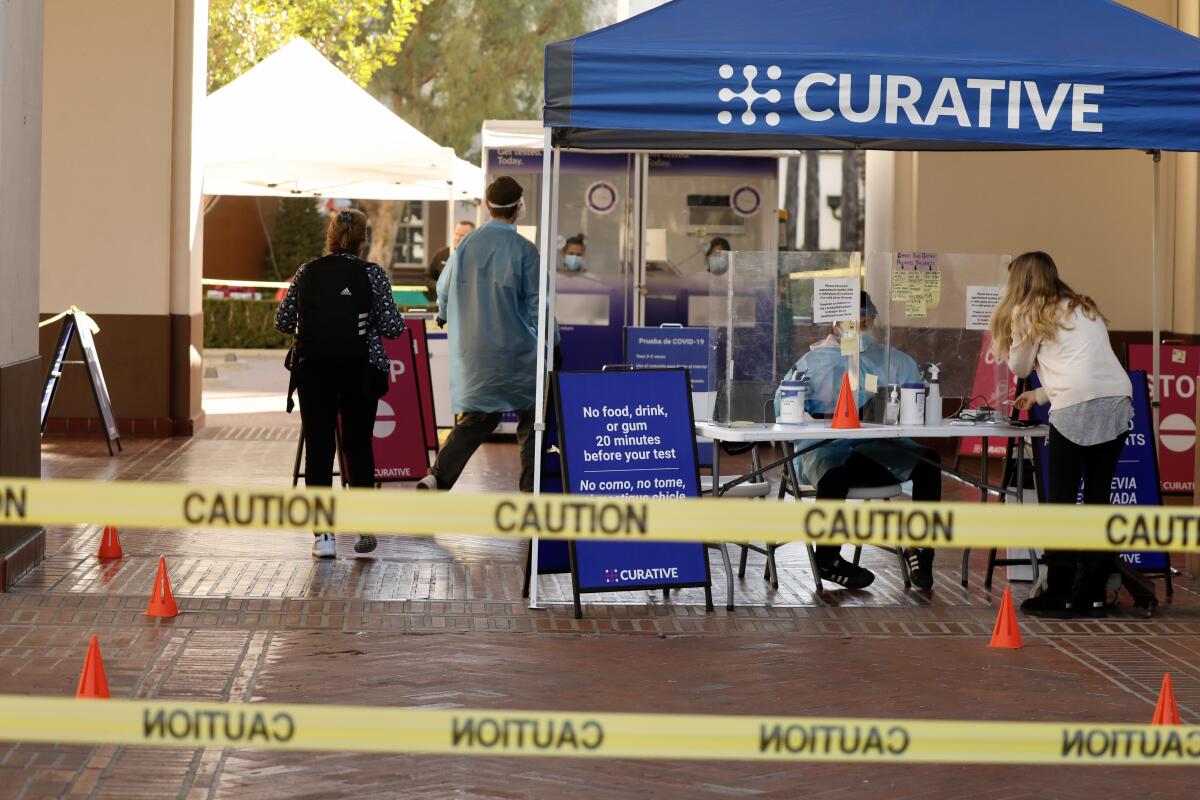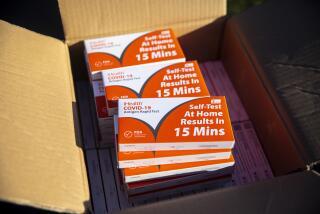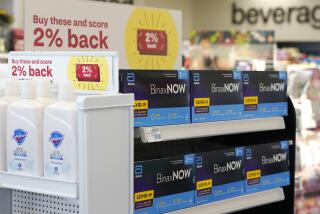L.A. using coronavirus test that FDA warns may produce false negatives

The coronavirus test being provided daily to tens of thousands of residents in Los Angeles and other parts of California may be producing inaccurate results, according to guidance from federal officials that could raise questions about the accuracy of infection data shaping the pandemic response.
The guidance from the Food and Drug Administration warns healthcare providers and patients that the test made by Curative, a year-old start-up founded in Silicon Valley that supplies the oral swab tests at L.A.’s 10 drive-through testing sites, carries a “risk of false results, particularly false negative results.”
To reduce the risk of false negatives, the Curative test should be used only on “symptomatic individuals within 14 days of COVID-19 symptom onset,” and the swab should be observed and directed by a healthcare worker, the FDA said.
The guidance, issued Monday, repeats the instructions that the FDA issued when the test was first granted an emergency use authorization.
The FDA warning appears to sharply contradict Los Angeles Mayor Eric Garcetti, who in April made coronavirus testing available to anyone, regardless of symptoms. In August, Garcetti said he disagreed with the federal Centers for Disease Control and Prevention that the tests should be given only to symptomatic patients, guidance that officials have since modified.
The conflicting approaches raise new questions about the accuracy of the city’s coronavirus positivity rates, including whether false negatives gave people the erroneous assumption they could ignore public health guidance and gather with others outside their households, contributing to a record-high level of community spread.
Garcetti, responding to questions at a news conference Thursday, agreed that the Curative test is designed for screening people who are visibly ill, but he added that the tests are also effective at catching cases in people who are asymptomatic. He said that about one-third of the positive test results from the city’s program — about 92,000 — were from people without symptoms.
The data provided by the asymptomatic testing program, which has allowed the city to test a massive number of people without hiring thousands of healthcare workers, have helped the city predict surges in hospitalizations and deaths from COVID-19, he said.
“This is something that has saved lives, will continue to save lives,” Garcetti said. “If we move away from it, I fear we would have a lot fewer people diagnosed, and even more spread.”
Curative, founded by a 25-year-old British businessman, has administered more than 11 million tests nationwide, including in other major cities such as Chicago, San Francisco, Houston, Atlanta, Miami and Seattle. The company holds a $42-million contract to perform testing in U.S. military treatment facilities and also tests members of Congress, including those who do not have symptoms.
Unlike nasal swab tests, which must be administered by a medical professional deep into a patient’s nose, the Curative test is an oral swab that can be self-administered. Patients are required to cough three times, swish the spit in their mouths, then rub a cotton swab around their gums, cheeks and tongue.
The Times reported in April that although Curative’s process is far more comfortable than that of the nasal swab tests and makes tests far more widely available, it is not the method recommended by the FDA and might be less accurate.
Los Angeles County discontinued Curative’s oral swab test at its testing sites in June. Public Health Director Barbara Ferrer said at the time that nasal tests produced fewer false negatives.
Dr. Clemens Hong, who oversees coronavirus testing for L.A. County, said in an email that the county is aware of the FDA guidance and is “reviewing and assessing results from clinical studies.” He said any type of test poses a risk of false negatives, because the results rely on the correct collection of the saliva sample and the viral load that it may contain.
Curative still processes a “limited number” of tests at pop-up testing sites that are supported by the county, Hong said.
The city continues to administer the Curative oral swab test at 10 drive-through and walk-up testing sites, including a massive facility at Dodger Stadium that processes thousands of tests a day.
The FDA’s guidance warned that the Curative test should be “directly observed and directed during the sample collection process by a trained health care worker at the specimen collection site.”
At Dodger Stadium, patients administer the test on themselves inside their cars. A video showing the correct method of administering the swab plays on massive screens at the testing site, and the bag containing the test supplies — which is
handed through the car window — contains instructions, too.
“Would I like to catch 100%? Yes,” Garcetti said. “Do I know what percentages that are not being caught? No. But even symptomatic people, we’re not catching all of them, because they’re not always doing it exactly right.”
Since late March, more than 3.37 million coronavirus tests have been administered at the city’s testing sites, according to city data. Many of those tests were processed by Curative.
A Curative representative said in a statement that the company’s test “has been validated and is being offered during the pandemic under an Emergency Use Authorization, and is labeled with specific warnings, precautions, and limitations that FDA reiterated in the Safety Communication. The test performance and labeling, however, have not changed, nor has the company observed any changes in test performance.”
The study Curative conducted to validate its test excluded patients who were asymptomatic, and the company told the FDA, in its application for emergency authorization, that the test is “limited to patients with symptoms of COVID-19.”
When the FDA issued an emergency use authorization for Curative’s test in April, it specifically authorized the test for samples “from individuals suspected of COVID-19 by their healthcare provider.”
Curative is one of dozens of companies that fast-tracked a coronavirus test and obtained emergency use authorization from the FDA after the agency announced in late February that it was lifting regulatory hurdles.
Companies with emergency use authorization are not allowed to promote their tests as “safe or effective” for the detection of the virus. The policy spares the companies from having to meet federal approval guidelines that can take as long as two years.
Times staff writers Soumya Karlamangla and Melody Peterson contributed to this report.
More to Read
Start your day right
Sign up for Essential California for news, features and recommendations from the L.A. Times and beyond in your inbox six days a week.
You may occasionally receive promotional content from the Los Angeles Times.








